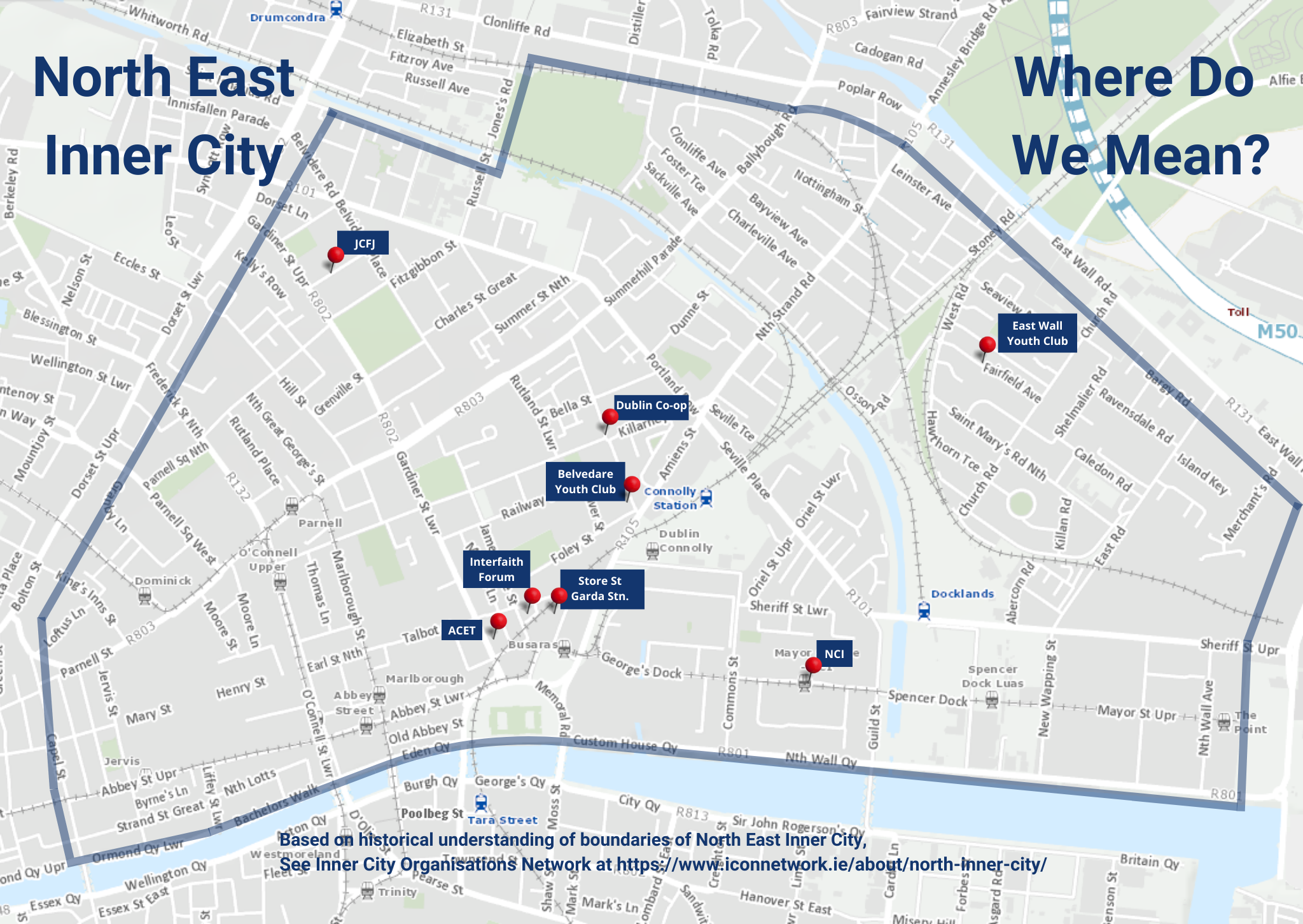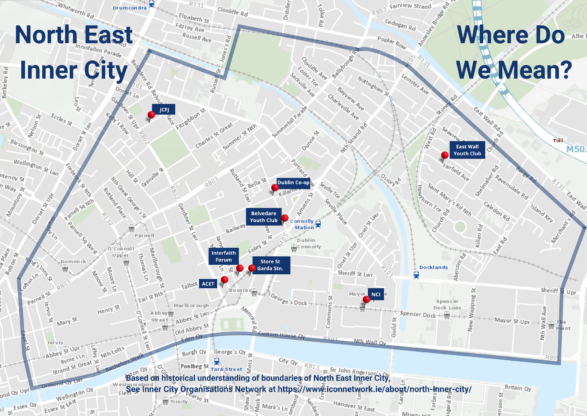
Fr. Niall Leahy SJ
Irish faith communities are at the forefront of the reception, welcome, and integration of society’s newfound diversity. When people gather together to worship God they gather in their diversity. More importantly, when they walk back out onto the street every Sunday, they walk out feeling that a few more threads of that divine web of belonging have been delicately weaved through all the bodies and souls that had gathered. This peaceful diversity is made possible by Christians embracing their identity as sons and daughters of God. It is a process —sometimes fast, sometimes slow— of realising that who we are is not ultimately based on what we look like, where we come from, how we talk, what we possess, what people think of us, or what we have worked hard for and achieved. All of these are contingent and secondary realities. Instead of holding on tightly to these threads, we are meant to place them in the hands of our
God who carefully and patiently knits them together (Ps 139).
In my time as a Jesuit priest in the North-East Inner-City, I have had the joy and honour of being welcomed into the lives of people whose families have been part of the tight-knit local community for generations. They have nothing in common with the young men who took trains from Celbridge or Longford to wreak havoc on November 23rd. They are as parochial as any other Irish person, but they are not racist. For some time they have not been happy and this unhappiness is simply an honest reflection on the sociological reality that comes from the dramatic demographic tumult that has been thrust upon them. Moreover, when your locality is neglected for decades, even as all the politicians are
busy extolling how successfully they are managing the economy, resentment grows. The streets around St Francis Xavier’s church are filled with emergency accommodation. The doctors are over-subscribed. The schools are struggling – heroically – to meet the needs they face. The kids have nowhere to play.
When a building goes up, it is likely apartments for wealthy foreign students or hotels for hen parties from Leeds rather than what is needed: family homes. The threads of the web of belonging have been systematically stretched to breaking point and it feels like everything is unravelling. The vicious attack on November 23rd took a knife to an already threadbare community and things could no longer hold.

Map of NEIC including locations of community development and advocacy organisations. Credit: Jesuit Centre for Faith and Justice
In the four decades that Working Notes has been published, JCFJ has never produced an issue like this. It does not address an overarching social theme or a particular social policy but it is concerned with a locality. It is an attempt to respond to the carnage of November 23rd before it is forgotten. It is an attempt to frame the reality of this vibrant and friendly part of our city ahead of the Local and European elections. The people who live in the North-East Inner-City are struggling against the odds and in many cases flourishing. But they are doing that largely without the support they need. Surrounded on all sides by quangos and boards, there is a flourishing civil society that is systematically famished by the shortterm funding priorities of the government. Home to levels of diversity unparalleled anywhere in the State, the community has done a remarkable job of adapting. This community is the primary victim of the riots. With all the moral grandstanding that followed and the deplorable talk in the Dáil by politicians about “scumbags” and “thugs”, this simple fact has been neglected.
When we sent out word about this Working Notes, every single group responded positively.
Not every group was in a place to write something. But this enthusiasm and willingness to collaborate, to welcome good ideas, to put our heads together on getting the truth out is remarkable, especially when the funding arrangements seem almost designed to set one group against another. The issue begins with the words of staff of the Dublin City Co-Op, an alliance of 13 grassroots inner city community development organisations dedicated to the delivery of social, economic and cultural services in the aftermath of the riots. This essay stands as a document to how the people actually living and working in the area have suffered because of this violence.
Interspersed between the essays are a series of photographic vignettes assembled by the JCFJ Communications Director, Cherise Boraski, loosely grouped under the title of “Humans of the North-East Inner-City”. This is neither a scientific cross-section of the area nor a statistically robust interrogation of people’s perspectives, but an opportunity to hear from ordinary people working and living in the neighbourhood about what matters to them. This issue is about hearing voices often drowned out by others. Through these short interviews, we hope to give another perspective on the needs of our place.
Josephine Bleach, director of the incredible Early Learning Initiative based out of the National College of Ireland has written an essay that explores how home visiting is catalysing transformative change in the
area. That this proven intervention is not properly funded by a State enjoying bountiful surpluses testifies to the sense of locals that they are overlooked. Education is so central to social rejuvenation and the love of learning is so embedded in this area that it is only fitting that we also welcome Tom O’Brien to write about the Community After Schools Project (CASPr) of which he is manager. CASPr is a community-based organisation that aims to provide educational support to children, parents and other adults in order to tackle educational inequality in the NEIC. Recognising the trauma which intergenerational poverty and addiction can instil in children from this area, the afterschool programmes aim to foster relationships and create a safe environment where they can flourish.
Dr Eunan Doyle is a retired Detective Superintendent with years of service in the North-East Inner-City. Since the knee jerk response to the riots was one of criminal justice, we are delighted to have Dr Doyle’s
penetrating contribution. The idea of “containment” is one that community leaders instinctively understood has been at play in the neighbourhood, but we now have a clear description of how the interests of locals are in competition with the interests of investors and political rhetoric in the policing of the area. Children, families, and older people’s opportunity to flourish in an illicit drug free environment is sacrificed to profit; as business representatives have an outsized effect on whole-community policing decisions.
Richard Carson has been working in the North-East Inner-City for decades. His remarkable essay is informed by those years of working at the front-lines of public health, his deep involvement in the new Christian churches that have arisen in the area, and his profound understanding of the social history
of the neighbourhood. His essay is both a philosophical reflection on how the past echoes into the present and how decisions made decades ago shape and constrain possibilities for tomorrow. Adrian Cristea brings the issue to a close with his description of the groundbreaking work of Dublin City Interfaith Forum. This is just one example of people in this neighbourhood already putting into practice what some might think impossible – establishing and growing a real social harmony between religious communities. As with so much else, the people I live with in the North-East Inner-City already know what they need and will not be slow to build it. Is it too much to ask that they would have the real
support of the State as they do that?
Martin Luther King famously said that “a riot is the language of the unheard.”1 The ordinary
people of the North-East Inner-City were not involved in the riots; they are its victims. But their voices remain largely unheard. We hope that this issue of Working Notes helps raise the voices of the people of the North-East Inner- City and that the many brilliant initiatives they sustain become more famous than the tired stereotypes and caricatures that seem to dominate among our political leadership. My neighbours deserve that.
1 Rev. Martin Luther King Jr, “The Other America” (Grosse Pointe High School, March 14, 1968), https://www.gphistorical.org/mlk/mlkspeech/.

